过去进行时讲解及习题
英语过去进行时的详细讲义和习题

过去进行时一、过去进行时表示过去某一时刻或某段时间正在进行的动作。
构成:过去进行时态由助动词be的过去式was/ were+现在分词(doing)构成,第一人称和第三人称单数用was,其余的都用were。
二、过去进行时态的形式过去进行时的肯定式:I was working. / You were working. / He/She/It was working./ We/You/They were working.过去进行时的否定式:I was not working. / You were not working. / He/She/It was not working./ We / You / They were not working.过去进行时的疑问式:Were you working at ten last night? Yes, I was. / No, I wasn’t.Was he working at ten last night? Yes, he was. / No, he wasn’t.三、过去进行时态的用法1、它表示在过去某一时刻或某一时间内正在进行或发生的动作,通常和表示时间点的时间状语一起用。
如:My parents were watching TV at 8:00 last night.昨晚八点钟时我的父母亲都在看电视。
They were swimming in the swimming pool this time last week.上个星期的这个时候他们正在游泳池游泳。
2、在表示过去一个动作发生的时候,另一个动作同时也正在进行,那么持续时间长的动作要用过去进行时态。
经常和when引导的时间状语从句连用。
如:When the teacher came in, I was singing.老师进来时我正在唱歌。
When someone knocked at the door, we were having supper.有人敲门时,我们正在吃晚饭。
(英语)英语过去进行时专项习题及答案解析含解析
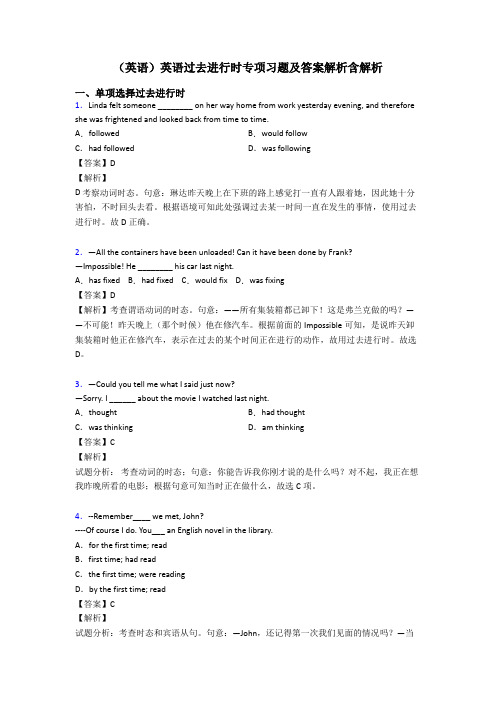
14.My mother asked me where _____, and I told her that I was going to buy some food.
A.I am goingB.am I goingC.I was goingD.was I going
【答案】C
【解析】
考点:考查时态
13.I______toward the door to go outside when suddenly Jim opened it.
A.was walkingB.walkedC.hadwalkedD.walk
【答案】A
【解析】
试题分析:句意:我正朝门口向外面走这时突然吉姆打开了门。从when suddenly Jim opened it.可知当吉姆打开门的时候,我正朝外面走,所以用过去进行时,选A。
—I’d just missed the last one. Fortunately,a friend _____ and he gave me a lift.
A.was just passingB.had just passed
C.would just passD.has just passed
【答案】A
【解析】
【详解】
考查时态。句意:——既然你的车昨天在路上坏掉了,你赶上回家的火车没?——我刚好错过了最后一列。幸运的是,一个朋友刚好路过,他顺路捎了我。结合语境可知,此处表达“我”在无助的时候“朋友刚好经过”,故用进行时,又事情发生在过去,所以用过去进行时,主语a friend是第三人称单数,故用was passing,故选A项。
C.had metD.has met
【答案】B
【解析】
(英语)高中英语过去进行时解题技巧和训练方法及练习题(含答案)含解析
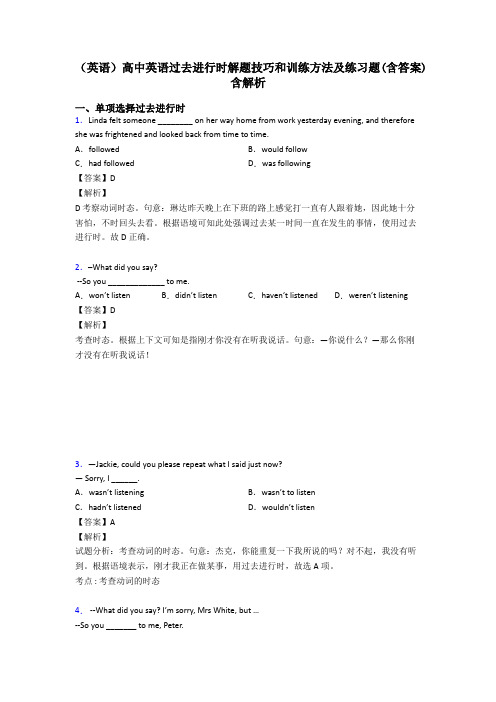
(英语)高中英语过去进行时解题技巧和训练方法及练习题(含答案)含解析一、单项选择过去进行时1.Linda felt someone ________ on her way home from work yesterday evening, and therefore she was frightened and looked back from time to time.A.followed B.would followC.had followed D.was following【答案】D【解析】D 考察动词时态。
句意:琳达昨天晚上在下班的路上感觉打一直有人跟着她,因此她十分害怕,不时回头去看。
根据语境可知此处强调过去某一时间一直在发生的事情,使用过去进行时。
故D正确。
2.–What did you say?--So you _____________ to me.A.won’t listen B.didn’t listen C.haven’t listened D.weren’t listening【答案】D【解析】考查时态。
根据上下文可知是指刚才你没有在听我说话。
句意:—你说什么?—那么你刚才没有在听我说话!3.—Jackie, could you please repeat what I said just now?— Sorry, I ______.A.wasn’t listening B.wasn’t to listenC.hadn’t listened D.wouldn’t listen【答案】A【解析】试题分析:考查动词的时态。
句意:杰克,你能重复一下我所说的吗?对不起,我没有听到。
根据语境表示,刚才我正在做某事,用过去进行时,故选A项。
考点 : 考查动词的时态4. --What did you say? I’m sorry, Mrs White, but …--So you _______ to me, Peter.A.haven’t listened B.weren’t listeningC.don’t listen D.hadn’t listened【答案】B【解析】试题分析:句意:--你刚才说什么了?对不起,怀特太太,可是…,--那么你没有听我说话,皮特。
英语中过去进行时的总结与练习题

英语中过去进行时的总结与练习题一、过去进行时的总结过去进行时是一种表示过去某个时间点或某个时间段内正在进行的动作的时态。
它常常与表示过去的时间状语连用,如“yesterday”, “last night”, “at that time”等。
过去进行时的基本结构是“was/were + 现在分词”。
1. 用途与功能•描述过去某个时刻正在进行的动作或状态。
•与过去某个时刻的短暂动作或状态进行对比。
•与一般过去时连用,表示两个过去动作同时发生。
2. 构成方式•主语为第三人称单数时,使用“was + 现在分词”。
•主语为其他形式时,使用“were + 现在分词”。
3. 与其他时态的区别•与一般过去时相比,过去进行时强调动作在过去的某个时间点或时间段内正在进行,而一般过去时则强调动作的完成或结束。
•与现在进行时相比,过去进行时描述的是过去的情景,而现在进行时描述的是现在的情景。
4. 常见的时间状语•at that time•at noon•at midnight•this morning/afternoon/evening•yesterday•last night•when, while引导的时间状语从句二、练习题选择题1.When I ______ my homework, my sister ______ TV.A. did; watchedB. was doing; was watchingC. was doing; watchedD. did; was watching2.They ______ a football match from 7 to 9 last night.A. watchedB. are watchingC. were watchingD. watch3.What ______ you ______ at 8 o’clock last night?A. did; doB. were; doingC. are; doingD. do; do4.It was raining hard. They ______ just ______ their umbrellas.A. had; leftB. have; leftC. had; been leavingD. were; leaving5.We ______ a film at 8 last night when the power cut off.A. watchedB. are watchingC. were watchingD. had watched填空题1.I ______ (cook) dinner when the phone rang.st night, they ______ (play) cards when I ______ (arrive) home.3.While the teacher ______ (explain) the text, the students ______ (take) notes.4.We ______ (have) a meeting from 2 to 4 yesterday afternoon.5.When I ______ (get) to the station, the train ______ (leave).翻译题1.昨天晚上8点,我正在做作业,而我的弟弟正在看电视。
初中英语过去进行时的用法例句、练习及答案
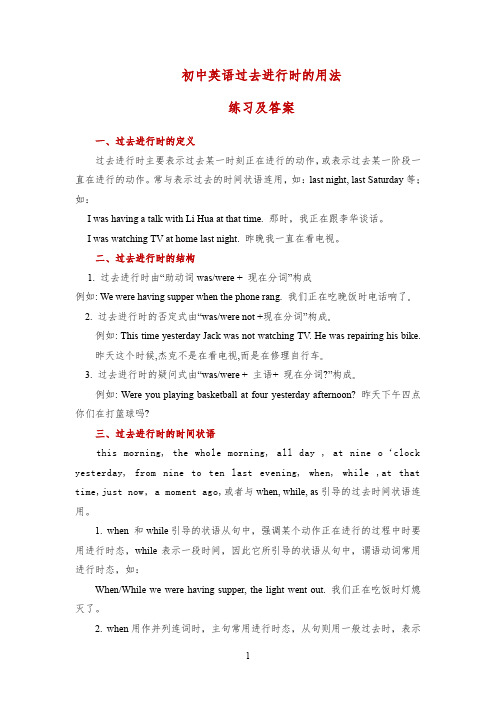
初中英语过去进行时的用法练习及答案一、过去进行时的定义过去进行时主要表示过去某一时刻正在进行的动作,或表示过去某一阶段一直在进行的动作。
常与表示过去的时间状语连用,如:last night, last Saturday等;如:I was having a talk with Li Hua at that time. 那时,我正在跟李华谈话。
I was watching TV at home last night. 昨晚我一直在看电视。
二、过去进行时的结构1. 过去进行时由“助动词was/were + 现在分词”构成例如: We were having supper when the phone rang. 我们正在吃晚饭时电话响了。2. 过去进行时的否定式由“was/were not +现在分词”构成。例如: This time yesterday Jack was not watching TV. He was repairing his bike.昨天这个时候,杰克不是在看电视,而是在修理自行车。3. 过去进行时的疑问式由“was/were + 主语+ 现在分词?”构成。例如: Were you playing basketball at four yesterday afternoon? 昨天下午四点你们在打篮球吗?三、过去进行时的时间状语this morning, the whole morning, all day , at nine o‘clock yesterday, from nine to ten last evening, when, while ,at that time,just now,a moment ago,或者与when, while, as引导的过去时间状语连用。
1. when 和while引导的状语从句中,强调某个动作正在进行的过程中时要用进行时态,while表示一段时间,因此它所引导的状语从句中,谓语动词常用进行时态,如:When/While we were having supper, the light went out. 我们正在吃饭时灯熄灭了。
过去进行时知识点综合讲解及其习题专练(附答案)(完整版)
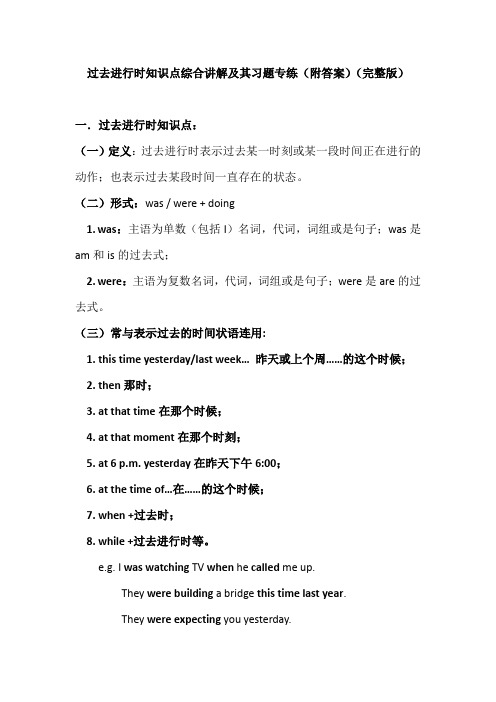
过去进行时知识点综合讲解及其习题专练(附答案)(完整版)一.过去进行时知识点:(一)定义:过去进行时表示过去某一时刻或某一段时间正在进行的动作;也表示过去某段时间一直存在的状态。
(二)形式:was / were + doing1. was:主语为单数(包括I)名词,代词,词组或是句子;was是am和is的过去式;2. were:主语为复数名词,代词,词组或是句子;were是are的过去式。
(三)常与表示过去的时间状语连用:1. this time yesterday/last week… 昨天或上个周……的这个时候;2. then那时;3. at that time在那个时候;4. at that moment在那个时刻;5. at 6 p.m. yesterday在昨天下午6:00;6. at the time of…在……的这个时候;7. when +过去时;8. while +过去进行时等。
e.g. I was watching TV when he called me up.They were building a bridge this time last year.They were expecting you yesterday.He was reading when the rainstorm came.While Mary was sleeping, Tom was doing his homework.(四)过去进行时中肯定句,否定句和一般疑问句的转换规则及一般疑问句的肯定及否定回答的知识点汇总。
含有be动词(was/were)的陈述句转换为一般疑问句时,直接把be动词提到句首,然后把“.”转换为“?”即可,其中第一人称I 和we要相应的转换为第二人称you。
肯定及否定回答用相对应的be 动词来回答即可,但是主语需转换为对应的人称代词(there be句型除外,直接用there来回答);若是肯定句转换为否定句,直接在be 动词后面加not,可缩写,可全称;但否定回答只能用缩写。
过去进行时经典例题
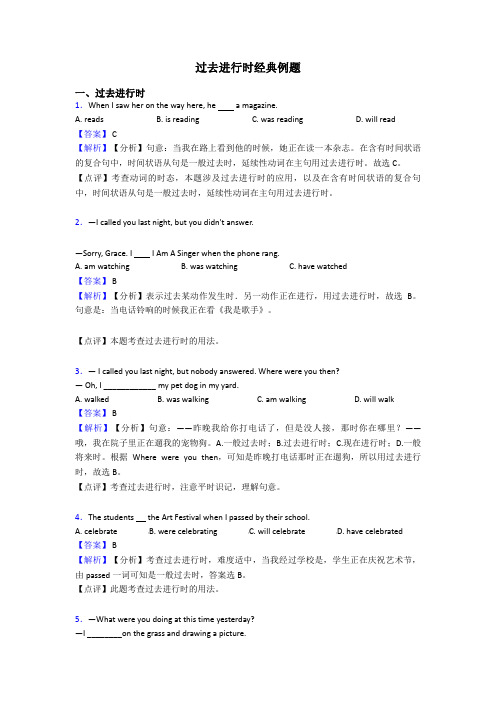
过去进行时经典例题一、过去进行时1.When I saw her on the way here, he a magazine.A. readsB. is readingC. was readingD. will read【答案】 C【解析】【分析】句意:当我在路上看到他的时候,她正在读一本杂志。
在含有时间状语的复合句中,时间状语从句是一般过去时,延续性动词在主句用过去进行时。
故选C。
【点评】考查动词的时态,本题涉及过去进行时的应用,以及在含有时间状语的复合句中,时间状语从句是一般过去时,延续性动词在主句用过去进行时。
2.—I called you last night, but you didn't answer.—Sorry, Grace. I I Am A Singer when the phone rang.A. am watchingB. was watchingC. have watched【答案】 B【解析】【分析】表示过去某动作发生时.另一动作正在进行,用过去进行时,故选B。
句意是:当电话铃响的时候我正在看《我是歌手》。
【点评】本题考查过去进行时的用法。
3.— I called you last night, but nobody answered. Where were you then?— Oh, I ____________ my pet dog in my yard.A. walkedB. was walkingC. am walkingD. will walk【答案】 B【解析】【分析】句意:——昨晚我给你打电话了,但是没人接,那时你在哪里?——哦,我在院子里正在遛我的宠物狗。
A.一般过去时;B.过去进行时;C.现在进行时;D.一般将来时。
根据Where were you then,可知是昨晚打电话那时正在遛狗,所以用过去进行时,故选B。
【点评】考查过去进行时,注意平时识记,理解句意。
过去进行时练习题及答案
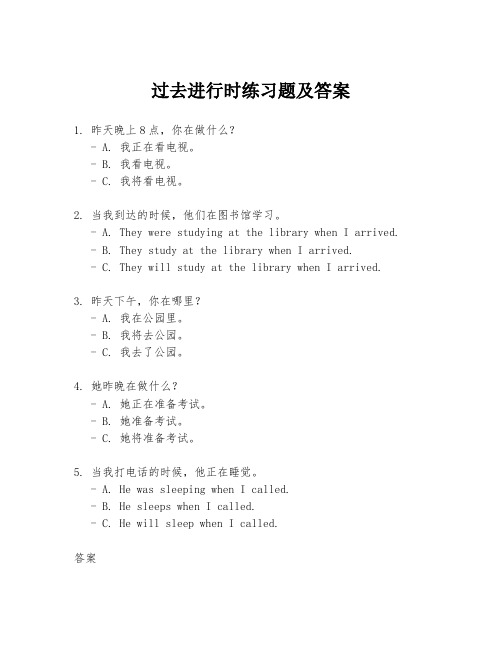
过去进行时练习题及答案1. 昨天晚上8点,你在做什么?- A. 我正在看电视。
- B. 我看电视。
- C. 我将看电视。
2. 当我到达的时候,他们在图书馆学习。
- A. They were studying at the library when I arrived. - B. They study at the library when I arrived.- C. They will study at the library when I arrived.3. 昨天下午,你在哪里?- A. 我在公园里。
- B. 我将去公园。
- C. 我去了公园。
4. 她昨晚在做什么?- A. 她正在准备考试。
- B. 她准备考试。
- C. 她将准备考试。
5. 当我打电话的时候,他正在睡觉。
- A. He was sleeping when I called.- B. He sleeps when I called.- C. He will sleep when I called.答案1. A2. A3. A4. A5. A解析1. 题目要求描述过去某个时间点正在进行的动作,因此使用过去进行时。
2. 同样,描述到达时正在进行的动作,使用过去进行时。
3. 描述昨天下午的动作,应该使用过去进行时。
4. 描述昨晚的动作,使用过去进行时。
5. 描述打电话时的动作,使用过去进行时。
注意事项- 过去进行时通常与时间状语连用,如“yesterday,” “last night,” “at that time,” “when I arrived”等。
- 过去进行时可以表示过去某个时间点的动作,也可以表示过去一段时间内持续进行的动作。
- 与一般过去时不同,过去进行时强调的是动作的进行状态,而一般过去时强调的是动作的完成。
希望这些练习题和答案能帮助你更好地理解和使用过去进行时。
- 1、下载文档前请自行甄别文档内容的完整性,平台不提供额外的编辑、内容补充、找答案等附加服务。
- 2、"仅部分预览"的文档,不可在线预览部分如存在完整性等问题,可反馈申请退款(可完整预览的文档不适用该条件!)。
- 3、如文档侵犯您的权益,请联系客服反馈,我们会尽快为您处理(人工客服工作时间:9:00-18:30)。
过去进行时讲解与习题1.概念过去进行时是表示过去某一时刻或某一时间正在进行或发生的动作,可以从两个方面来理解:1 过去某一时刻正在进行或发生的动作。
如:They were playing football at ten o’clock yesterday morning.My mother was cooking when I got home.I was washing my clothes at this time yesterday.2 过去某阶段持续进行的动作。
如:I was staying at home last weekend.常与过去某一特定的时间状语连用,如last night, at that time, at 8:00 yesterday,last Sunday , at this time yesterday, from 7 to 9 last night等。
也有时没有时间状语,要通过上下文的暗示来确定用过去进行时。
E.g. The students all worked hard. Everyone knew what he was working for.另外,也可用于when/while引导的时间状语从句中。
但在复合句中,若主要动作和背景动作是同时发生的,那么主从句都可用过去进行时。
如:It was raining when they left the hospital.Jenny was reading while Danny was writing.2.句型结构⑴肯定句:主语+ was/were + 动词现在分词(doing) + 其他.如:I was playing basketball at 6:30 yesterday.He was playing the piano at that moment.They were doing homework at 8:00 last night⑵否定句:主语+ was/were + not + 动词现在分词(doing)+ 其他如:I was not playing basketball at 6:30 yesterday.He wasn’t playing the piano at that moment.They weren’t doing homework at 8:00 last night.⑶一般疑问句:Was/Were + 主语+ 动词现在分词(doing) + 其他?如:Were you playing basketball at 6:30 yestetday?---Yes, I was./No, I wasn’t.Was he playing the piano at that moment?---Yes, he was./No, he wasn’t.⑷特殊疑问句:特殊疑问词+ 一般疑问句?如:What were you doing at8:00pm yesterday?Where was he working at that time?注:其句式变化仍然要在be上做文章练习㈠用所给动词的正确形式填空。
1.Jim _____(write) a letter at that moment.2.W hen the telephone _______(ring),she______(do) her homework.3.W hen I ______(leave) the part,the people ______(enjoy) themselves.4.______ they______ (feed) the animals at 5:00 yesterday afternoon?5. Mrs.Green __________ (not wash) clothes at this time yesterday.6. Grandpa ____________ (mend) his clock when I reached home.7.As I _____ (walk) in the park, I saw some children playing games.㈡、单选1 What ______ from three to four yesterday afternoon?A have you doneB had youdone C did you do D were you doing2 – I call you yesterday evening, but there was no answer.- Oh., I’m sorry I _____ dinner at my friend’s home.A homeB hadC was havingD have had3 My mother _____ while my father_____TV.A cooked; was watchingB was cooking; was watchingC was cooked; watchedD cooked; watched4 When I got home, my son _____ the music.A am listening toB listened toC was listening toD was listening5 We heard a cry when we ______ TV last night.A were watchingB wouldwatch C watch D watched6 Could you tell me when ______?A she is comingB she wascoming C will be come D is he coming7 The teacher ______ when I came into the classroom.A is drawingB drawsC has drawnD was drawing8 Nobody noticed what she ______ at the moment.A will doB was doingC has doneD had done9 Was it raining hard when you _____ this morning?A leftB leavesC was leavingD would leave现在完成时讲解与习题1.概念⑴表示过去发生的动作对现在的影响和结果依然存在(已完成)。
常与副词already(肯定),yet(否定,疑问),just,ever,never,once,twice,befoe等连用。
如:We have already known each other.I have just washed my face.He has been to this island before.⑵也表示过去发生的动作或状态一直持续到现在,且有可能继续下去(未完成)。
常与for(+时间段),since(+时间点或过去时的句子),so far等表示一段时间的状语连用。
如:如:We have lived there since 2000.Mr.zhang has been in Beijing for over thirty years.He has learned English since he was 6 years old.注:这种用法中的动词用延续性动词。
非延续性动词要用延续性动词代替。
常见非延续性动词与延续性动词的转换:buy—have borrow—keep come—be hereleave/go—be away begin/start—be on die—be dead join—be in如:I have kept(borrow) the book for two weeks.She has had(buy) this bike for a year.The old man has been dead(die) since last year.They have been away(leave) for two hours.2.句型结构⑴肯定句:主语+ have/has + 动词过去分词+ 其他。
(主语是第三人称单数时用has,其他人称用have)。
如:I have done my homework since6:00.They have found the lost boy.She has gone to Beijing since she was 16 years old.⑵否定句:主语+ have/has + not + 动词过去分词+ 其他。
如:They have worked for 20 hours.→They haven’t worded for 20 hours.He has had his breakfast.→He hasn’t had his breakfast.⑶一般疑问句:Have/Has + 主语+ 动词过去分词+ 其他?如:She has been to Beijing.→Has she been to Beijing?---Yes,she has./No,she hasn’t.They have already learned threeEnglish songs.→Have theylearned three English songs yet?---Yes,they have./No,they haven’t.⑷特殊疑问句:特殊疑问词+ 一般疑问句?如: How many words has he learnedyet?How long hawe you lived here?注:have/has been to 表示“去过某地”(已回来).瞬间动词形式have/has gone to 表示“去某地了”(还未回来)人不在说话处,主语常用第三人称。
Have/has been in 表示“已经。
”(持续的).持续性动词形式3.过去分词变化规则⑴规则动词过去分词同过去式。
⑵不规则动词需要记忆。
① AAA型1) cost—cost—cost 2) cut—cut—cut 3) hit—hit—hit4) hurt—hurt—hurt 5) let—let—let 6) put—put—put7) read—read—read 8) set—set—set 9) shut—shut—shut②AAB型1) beat—beat—beaten③ ABA型1) become—became—become 2) come—came—come 3) run—ran—run④ABB 型1) bring—brought—brought 2) buy—bought—bought 3) think—thought—thought4) catch—caught—caught 5) teach—taught—taught 6) build—built—built7) lend—lent—lent 8) send—sent—sent 9) spend—spent—spent10) lose—lost—lost 11) smell—smelt—smelt 12) burn—burnt—burnt13) feel—felt—felt 14) learn—learnt—learnt 15) hear—heard—heard16) mean—meant—meant 17) keep—kept—kept 18) sleep—slept—slept19) sweep—swept—swept 20) tell—told—told 21) stand—stood—stood22) understand—understood—understood 23) say—said—said24) pay—paid—paid 25) meet—met—met 26) leave—left—left27) hold—held—held 28) dig—dug—dug 29) find—found—found30) get—got—got31) hang—hung—hung 32) have—had—had33) make—made—made 34) shine—shone—shone 35) sit—sat—sat36) win—won—won⑤ABC型1) blow—blew—blown 2) draw—drew—drawn 3) fly—flew—flown4) grow—grew—grown 5) throw—threw—thrown 6) know—knew—known7) choose—chose—chosen 8) eat—ate—eaten 9) fall—fell—fallen10) ride—rode—ridden 11) rise—rose—risen 12) hide—hid—hidden13) see—saw—seen 14) shake—shook—shaken 15) take—took—taken16) mistake—mistook—mistaken 17) wake—woke—waken18) write—wrote—written 19) be—was/were—been 20) do—did—done21) break—broke—broken 22) forget—forgot—forgotten 23) give—gave—given24) freeze—froze—frozen 25) begin—began—begun 26) ring—rang—rung27) drink—drank—drunk 28) go—went—gone 29) lie—lay—lain30) sing—sang—sung 31) swim—swam—swum 32) wear—wore—worn33) show—showed—shown 34) sink—sank—sunk练习:A.用所给词的适当形式填空。
